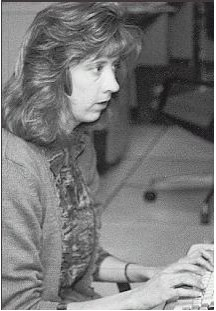
(See related pages)
Special Unit A former officer said that the department had set up a special unit to discourage blacks from driving into west Belleville by ticketing them whenever possible. "I then met several officers at odd hours of the night in dark bars to get the inside story on the unit," Tuft says. "Everyone backed up the account. But they worried about a story. One officer met me in a greasy spoon and tried to convince me that this story could begin a race riot in the town." Tuft's major problem was that there was nothing in writing about the unit, no physical evidence of what it had been doing, nothing to prove what she had been told: A unit of four officers, the blue team, had been set up with the express purpose of harassing black motorists. Seeking Documentation "I was determined to get the story, and determined is what you have to be," Tuft says. She knew that the proof would be in the traffic tickets. And that is where she looked. "I spent three months in a stuffy old parking garage storage room sorting through dusty, musty old traffic tickets in banana boxes almost too heavy for me to pick up. They weighed 50 pounds each, and I weigh about 100." Tuft looked through more than 175,000 tickets. And she interviewed many of those who were ticketed for their personal experiences. She organized her ledger entries by computer. Finally, she was ready to write. When she finished, the story went to her city editor, Gary Dotson, who had encouraged her despite the possibility of a strong reader reaction. Then it went to the newspaper's attorneys for a libel check. Here is how the first piece begins:
The Reaction Readers and advertisers reacted, most with anger at Tuft and the News-Democrat. A dozen businesses pulled their advertising, and almost 1,200 readers canceled subscriptions. "I received about 300 angry calls, many telling me and the newspaper to leave town," Tuft says. Some callers accused her of sleeping with a black man, and most those furious with the newspaper for the stories used the word "nigger" in their calls. "I received at least half a dozen death threats. One hoped I'd be raped by a 'group of AIDS-infected wilding niggers.'" One of Tuft's stories disclosed the city's hiring practices: Not one of the city's 384 employees was black, and in the city's 175-year history it had never hired a black person, although the city has a 7 percent black population. This revelation, she says, "caused the most hatred against me." The Results After her series, the city hired a black sanitation worker and a black fireman and initiated an affirmative action program to hire minorities and to promote women in a manner that reflects the makeup of Belleville. Programs were set up to educate the public in racial and ethnic diversity. Tuft's work was recognized. She won 13 local, regional and national awards, and her stories were used on the television program "60 Minutes." The St. Louis Post-Dispatch offered her a job, which she accepted. |
